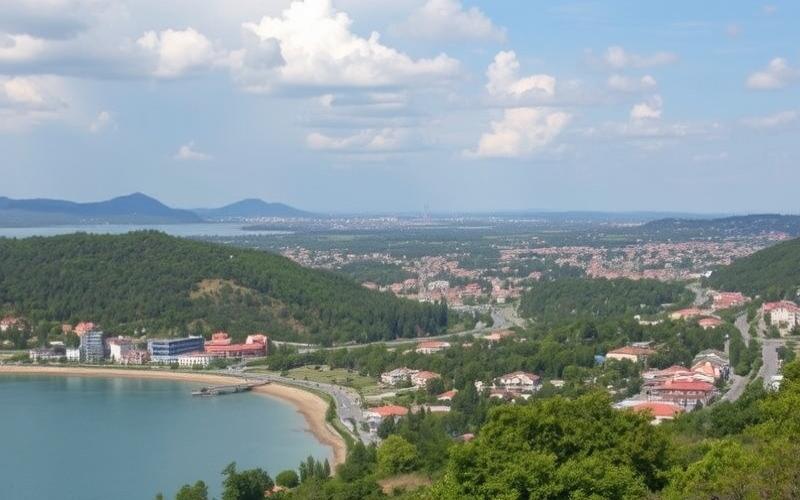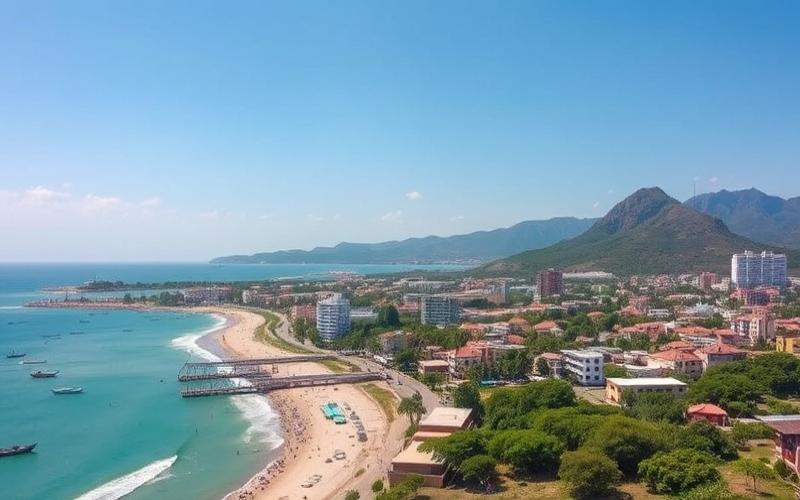
 Published on and written by Cyril Jarnias
Published on and written by Cyril Jarnias
As the Ukrainian crisis reverberates across the European continent, its repercussions are being felt as far as North Macedonia, marking an unforeseen turning point in the country’s real estate sector. This small Balkan state, often overshadowed by larger neighbors in the region, is seeing its real estate market subjected to unprecedented pressures, partly due to migratory flows resulting from the conflict and the global economic fluctuations it has generated.
By scrutinizing current transformations, an analysis of these dynamics reveals how the conflict has shaped unique opportunities and challenges for investors and local residents, altering the prospects of a previously booming sector and underscoring the global interconnectedness of geopolitical and economic issues.
Geopolitical Consequences on the Real Estate Market
Geopolitical Consequences of the War in Ukraine on North Macedonia’s Real Estate Market
- Major Economic Changes:
- The geopolitical uncertainty linked to the war has led to increased volatility in exchange rates and financial markets, making foreign investors more hesitant about the local real estate market.
- Fluctuations in interest rates are notable: during international instability, these rates tend to increase, complicating access to mortgage credit and raising the overall cost of real estate loans.
- Overall investor confidence is impacted: some still view real estate as a safe haven, while others limit their exposure to markets perceived as vulnerable.
- Evolution of Foreign Investments
- The displacement of international capital from unstable areas (Russia, Ukraine) may generate a temporary influx of wealthy investors seeking a more stable environment.
- However, regulatory or fiscal tightening can hinder some international transactions and increase the local market’s dependence on external flows.
- Impact on Mortgage Credit and Fiscal Policies
- The increase in key interest rates by central banks to contain inflation makes access to financing more difficult for local households.
- Authorities may need to adjust their fiscal policies (notably property taxes or investment incentives) to stabilize the sector in the face of sharp demand variations or to limit foreign speculation.
- Displacement of Populations/Capital
- Potential migratory movements linked to the regional conflict can influence rental demand and temporarily modify certain segments of the residential stock.
- The rapid transfer of foreign capital can also cause a sudden price increase in certain sought-after neighborhoods or exacerbate inequalities in access to property.
| Factor | Pre-war | Post-conflict onset |
| Foreign Investments | Progressive growth | Increased volatility / possible reorientation |
| Exchange Rates | Relatively stable | High volatility |
| Access to Credit | Favorable conditions | Progressive tightening |
| Investor Confidence | Moderate/stable | Weakened / segmented |
The accumulation of uncertainties (prolonged armed conflict, high inflation) degrades general morale as well as that of investors. Some still see real estate as a safe haven; others hesitate to invest in the face of increased risk.
- Potential Effects of International Sanctions Against Russia:
- Restrictions on Russian financial flows complicate certain real estate transactions involving this investor profile.
- Increased regulatory control on the origin and cross-border circulation of funds applied by local institutions to comply with international requirements.
- Influence on Local Real Estate Development Strategies:
- Necessary adaptation to new economic conditions: consideration of the rising cost of imported materials (oil, cement), potential slowdown in the launch or delivery of new residential/commercial projects.
- Strategic orientation towards increased diversification: priority targeting of international buyers not directly exposed to sanctions; potential strengthening of rental housing to quickly respond to needs created by any temporary influx linked to regional displacements.
Good to Know:
The war in Ukraine has brought notable changes to the real estate market in North Macedonia, including a reassessment of foreign investments due to regional instability and exchange rate volatility. Investor confidence has been tested, affecting not only their willingness to invest but also access to mortgage credit, potentially requiring revisions of local fiscal policies to stimulate the market. The displacement of populations and capital has created additional pressure, influencing local housing demand. Moreover, international sanctions against Russia have complicated some real estate transactions, a factor that could redirect real estate development strategies towards alternative opportunities less exposed to these risks. Market players must remain vigilant in the face of these dynamics, adapting their operations and monitoring fiscal initiatives that could mitigate these economic turbulences.
Influx of Ukrainian Refugees and Impact on Housing
Estimated Number of Ukrainian Refugees in North Macedonia
The precise estimate of the number of Ukrainian refugees who have arrived in North Macedonia since the start of the war remains limited, as the majority of Ukrainians fleeing the Russian invasion have primarily headed to immediate neighboring countries or Western Europe. However, it is estimated that several hundred to a few thousand Ukrainians have transited through or temporarily settled in the country, although this figure is significantly lower than in main host hubs like Germany, Poland, or France.
Main Challenges for the Real Estate Sector
- Limited availability of affordable housing, especially in large cities like Skopje where supply is already constrained.
- Difficult financial accessibility for refugees often lacking sufficient resources and facing a tight rental market.
- Increased pressure on social housing and on some traditionally more accessible neighborhoods.
Strategies Implemented by the Government and Local Organizations
- Application of European mechanisms allowing accelerated access to temporary residence, with partial opening to the private rental housing market.
- Occasional provision of reception centers or collective housing to respond to urgent situations.
- Collaboration between local and international NGOs to materially support Ukrainian families (food distribution, administrative assistance).
Socio-economic Effects on the Local Real Estate Market
| Observed Effect | Detail |
|---|---|
| Local Rent Increase | Especially in some central neighborhoods favored by expatriates. |
| Increased Tension on Small Housing | Studios, 1-bedroom apartments particularly in demand. |
| Affected Neighborhoods | Areas near public services (health, schools), notably around Skopje. |
Some landlords have sometimes taken advantage of sudden demand to raise their prices on certain types of housing sought by these new arrivals.
Support Measures and Initiatives Aiming for Market Balance
- Active orientation towards the existing social housing stock when available
- Legal support to facilitate the quick signing of temporary leases
- Incentives for private landlords to accept more tenants with temporary status
Free language workshops and local programs also promote gradual integration, facilitating their autonomous access to ordinary housing.
Testimonials: Experience and Housing Adaptation
“Finding an apartment was very difficult… The prices were too high for us alone; it’s thanks to a Macedonian family who took us in that we were able to stay together,” recounts Olena, a refugee who arrived in early 2023.
Some local residents express their solidarity but also their concerns about increased competition for some cheap housing:
“We understand their situation but it’s becoming difficult even for our local young families to find something without paying more,” testifies a city center resident.
Expected Long-term Repercussions
- The temporary but visible arrival of refugees could encourage a rethinking of some urban policies related to social housing.
- A lasting strengthening of associative networks dedicated to reception could globally improve resilience in the face of future migration crises.
- However, if the influx were to last or intensify without major structural adjustments on the supply side of affordable housing, it risks durably exacerbating the already existing pressure on this fragile sector.
Good to Know:
Since the start of the war, approximately 5,000 Ukrainian refugees have found refuge in North Macedonia, posing significant challenges to the local real estate market. The limited availability of affordable housing exacerbates the situation, with a notable price increase, especially in sought-after central neighborhoods. The government and various NGOs have responded by adapting temporary housing and subsidizing rents for the most vulnerable. Community initiatives, such as inclusive social integration programs, aim to facilitate housing access for refugees while preserving market stability. Testimonials from Ukrainian families and local residents reveal how solidarity and new community dynamics are shaping this evolving real estate landscape. The long-term impact translates into continued pressure on real estate infrastructure and a necessity for sustainable strategies to meet this increased demand.
Effects of the Ukrainian Crisis on Investments
The direct and indirect impact of the war in Ukraine on the investment climate in North Macedonia is manifested by a notable deterioration in the confidence of foreign and local investors. The persistence of the conflict has led to widespread geopolitical instability in the region, reinforcing the perceived risks by investors. Geopolitical upheavals, notably linked to the war in Ukraine as well as disinformation campaigns, affect the political and economic climate of all European countries, including North Macedonia. This has resulted in a slowdown in foreign direct investment (FDI) flows, marked wait-and-see attitudes among local economic actors, and increased volatility in financial markets.
Investors are now adopting a more cautious attitude in the face of persistent uncertainties, whether for the acquisition of real estate assets or for financing new industrial or commercial projects.
Regarding the real estate sector, several major trends are observed:
- Relative decrease in foreign demand: FDI directed towards real estate has seen a moderate decline since 2022.
- Refocusing on local investment: Faced with foreign withdrawal, some national capital has repositioned itself on real estate assets considered safe havens.
- Price variations:
- In some large cities like Skopje, relative stability or a slight increase in prices is observed in some sought-after residential segments.
- Other less attractive segments sometimes record stagnation or even a moderate correction.
- Supply and construction activity:
- Developers have slowed the launch of new residential or commercial projects in the face of the prevailing economic uncertainty.
- Several construction projects planned before 2022 have been postponed or canceled due to a lack of international institutional investors.
| Indicator | Observed Trend |
|---|---|
| Foreign Demand | Moderate decrease |
| Local Demand | Slight progression |
| Prices (urban centers) | Stability / slight increase |
| Prices (peripheral areas) | Stagnation / occasional decrease |
| Construction Activity | General slowdown |
Faced with these challenges, several government policies have been implemented to mitigate the negative effects:
- Mobilization of approximately 210 million EUR in the form of European macro-financial aid intended to stabilize the national economy and support various key sectors including housing
- Accelerated adoption of structural reforms to improve the regulatory framework related to real estate investments
- Recent launch by the European Union of a new regional plan endowed with substantial funds specifically targeting the Western Balkans; these funds notably aim to revive construction activity, modernize some aging urban infrastructure, and strengthen overall financial resilience
Recent statistics illustrating this evolution:
- Between early 2022 and mid‑2025, it is observed that the total volume of direct real estate investments decreased between –7% and –12% according to sources,
- The total number of permits issued for new residential constructions has fallen below its pre-crisis average level,
- On the other hand, thanks to exceptionally high external budgetary support since late 2023 (European aid conditional on compliance with national political commitments) as well as some temporary local fiscal incentive measures (targeted relief on property taxes), there are now some timid but tangible signs of a gradual recovery in some strategic urban neighborhoods.
The Ukrainian crisis has therefore had a major but non-uniform disruptive effect: it has accentuated general caution while provoking locally some structural adaptations supported by various public initiatives.
Good to Know:
The Ukrainian crisis has disrupted the investment climate in North Macedonia, eroding the confidence of foreign and local investors due to growing geopolitical uncertainty. The real estate sector has particularly felt the effects, with a slowdown in demand and price volatility, some investors postponing projects while others capitalized on potentially higher returns. Construction came to a halt in the most impacted regions, although government programs aim to stabilize the market, notably through tax incentives and loan guarantees to revive activity. According to the latest economic analyses, the volume of real estate investments has dropped by 15% this year, although signs of recovery are appearing through increased support for key infrastructure projects. Efforts are underway to restore confidence, but the situation remains delicate, dependent on ongoing international developments.
Disclaimer: The information provided on this website is for informational purposes only and does not constitute financial, legal, or professional advice. We encourage you to consult qualified experts before making any investment, real estate, or expatriation decisions. Although we strive to maintain up-to-date and accurate information, we do not guarantee the completeness, accuracy, or timeliness of the proposed content. As investment and expatriation involve risks, we disclaim any liability for potential losses or damages arising from the use of this site. Your use of this site confirms your acceptance of these terms and your understanding of the associated risks.









































